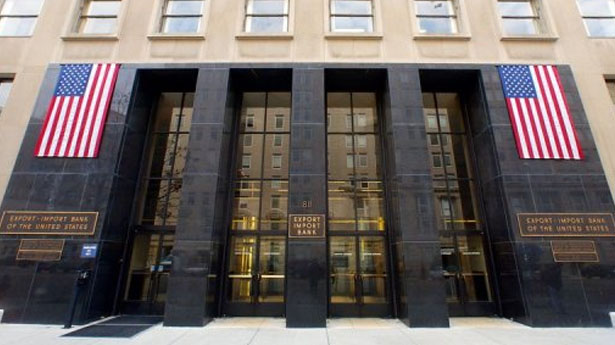By Jonah Bennett
The heightened controversy over the status of the US Export-Import Bank has been taken up by the House Financial Services Committee Wednesday in an effort to come to terms on whether the bank’s charter will be renewed in September.
The US Export-Import Bank (Ex-Im), an 80-year-old federal agency, provides government-backed loans to foreign buyers, in order to assist them in purchasing US products.
This issue dates back to 2012, when the then-House Majority Leader Eric Cantor blocked attempts by Republicans to turn down the bank’s renewal request. The bank’s charter expires in September, and the pressure on Ex-Im has significantly stepped up since Cantor lost his seat in a surprising primary upset.
The chairman of the House Financial Services Committee, Rep. Jeb Hensarling from Texas, stands strongly opposed to reauthorization. Hensarling has previously said that Ex-Im’s financing of Boeing Co. and Caterpillar Inc. counts as market interference and corporate welfare. House Speaker Boehner has declined to take a position regarding the activities of the bank.
But a number of businesses strongly concerned with a level playing field support the reauthorization of the Ex-Im bank, calling the abolition of the bank, “unilateral trade disarmament.” At the hearing on Wednesday, Rep. Carolyn Maloney entered into the record a letter from 865 organizations and businesses who strongly support Ex-Im, including the Chamber of Commerce and the National Association of Manufacturers.
“This many businesses can’t be wrong,” Rep. Maloney said at the hearing.
Steven Willburn, CEO of FirmGreen Inc., was called to testify before the committee, and expressed a similar sentiment. “I do not share, nor do I understand the rabid, anti-government animus that seems to motivating the current attacks on the Ex-Im bank. It provides small businesses with the opportunity to grow and not be limited to domestic markets. This is a public smear campaign,” he said.
Views on the bank’s status remain diametrically opposed, owing to a history of reforms being ignored by Ex-Im. Some members remained concerned about the prospect of complete elimination of the bank, with Rep. Brad Sherman in particular arguing that it would add billions to the national debt.
Reports alleging kickbacks and cronyism have only added heightened the focus on Ex-Im’s activities. Four Ex-Im officials have recently been removed after investigations revealed corruption. In particular, Johnny Gutierrez, an Ex-Im official, accepted cash payments from a Florida-based company which exports construction materials to Latin America.
Strong questions about Ex-Im’s accountability were also raised by members participating in the hearing. “Ex-Im says it takes seriously its mission to support US jobs and taxpayers. I would question the seriousness of this commitment,” Rep. Scott Garrett said. “We only learned of allegations of misconduct by reading the front page of the Wall Street Journal. Congress was not notified.
The heightened controversy over the status of the US Export-Import Bank has been taken up by the House Financial Services Committee Wednesday in an effort to come to terms on whether the bank’s charter will be renewed in September.
The US Export-Import Bank (Ex-Im), an 80-year-old federal agency, provides government-backed loans to foreign buyers, in order to assist them in purchasing US products.
This issue dates back to 2012, when the then-House Majority Leader Eric Cantor blocked attempts by Republicans to turn down the bank’s renewal request. The bank’s charter expires in September, and the pressure on Ex-Im has significantly stepped up since Cantor lost his seat in a surprising primary upset.
The chairman of the House Financial Services Committee, Rep. Jeb Hensarling from Texas, stands strongly opposed to reauthorization. Hensarling has previously said that Ex-Im’s financing of Boeing Co. and Caterpillar Inc. counts as market interference and corporate welfare. House Speaker Boehner has declined to take a position regarding the activities of the bank.
But a number of businesses strongly concerned with a level playing field support the reauthorization of the Ex-Im bank, calling the abolition of the bank, “unilateral trade disarmament.” At the hearing on Wednesday, New York Democratic Rep. Carolyn Maloney entered into the record a letter from 865 organizations and businesses who strongly support Ex-Im, including the Chamber of Commerce and the National Association of Manufacturers.
“This many businesses can’t be wrong,” Maloney said.
Steven Willburn, CEO of FirmGreen Inc., was called to testify before the committee, and expressed a similar sentiment. “I do not share, nor do I understand the rabid, anti-government animus that seems to motivating the current attacks on the Ex-Im bank. It provides small businesses with the opportunity to grow and not be limited to domestic markets. This is a public smear campaign,” he said.
Views on the bank’s status remain diametrically opposed, owing to a history of reforms being ignored by Ex-Im. Some members remained concerned about the prospect of complete elimination of the bank, with California Democratic Rep. Brad Sherman in particular arguing that it would add billions to the national debt.
Reports alleging kickbacks and cronyism have only added heightened the focus on Ex-Im’s activities. Four Ex-Im officials have recently been removed after investigations revealed corruption. In particular, Johnny Gutierrez, an Ex-Im official, accepted cash payments from a Florida-based company which exports construction materials to Latin America.
Strong questions about Ex-Im’s accountability were also raised by members participating in the hearing. “Ex-Im says it takes seriously its mission to support US jobs and taxpayers. I would question the seriousness of this commitment,” Rep. Scott Garrett said. “We only learned of allegations of misconduct by reading the front page of the Wall Street Journal. Congress was not notified.”
“The Ex-Im bank picks winners and losers,” Dr. Veronique de Rugy, senior research fellow at the Mercatus Center, added. “I think we can all agree that the federal government shouldn’t be sending our limited resources to the wealthiest and most politically connected corporations, and yet that’s what the Ex-Im bank does. Some say the Ex-Im bank support jobs and returns money to the treasury and taxpayers. None of these arguments withstand scrutiny,” she continued.
Others were more reluctant about heavy-handed action and preferred reform instead.
“We cannot exit the battlefield,” said Massachusetts Democratic Rep. Stephen Lynch. “This will drastically tip the balance in favor of foreign companies. No other country will voluntarily disarm.”
Christine Harbin, the national issue campaign manager for Americans For Prosperity, has been at the forefront of the issue in recent months. “We have been leading a coalition of conservative organizations in opposing Ex-Im,” Harbin told The Daily Caller News Foundation.
“You hear a lot about leveling the playing field, but they’re calling for a policy that does the exact opposite. We see in the bank’s request that they’re asking for an even longer reauthorization and are increasing the risk for taxpayers,” she added. “There’s a general lack of transparency in the bank’s activity. Ex-Im should be one of the first programs on the chopping block.”
Unified support among the GOP for shuttering the bank has not yet been achieved, and a group of 41 Republicans wrote to new House Majority Leader Kevin McCarthy this week, warning of the economic consequences of failing to renew Ex-Im’s charter.
Texas Gov. Rick Perry also wrote congressional leaders Wednesday urging reauthorization.
“The Ex-Im Bank’s services are essential in helping small and medium-sized Texas businesses thrive,” Perry contended.
Follow Jonah Bennett on Twitter





2 comments